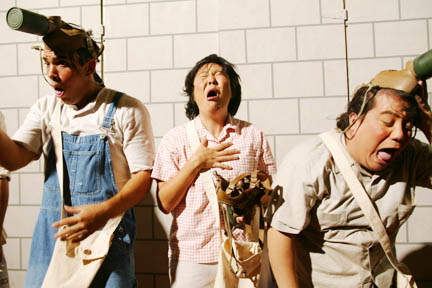

|
Wartime experience seen
through kids’ eyes
World War II has not been a particularly popular topic for Hawaii playwrights, and plays of recent vintage have explored the conflict from an adult perspective. Playwright Y York is thus taking a fresh look at wartime Hawaii by telling the story of the Japanese attack and its aftermath as experienced by four 11-year-old children.
|
"Nothing Is the Same," presented by Honolulu Theatre for Youth, continues at 1:30 and 4:30 p.m. Saturday through Nov. 13. Shows are at Richardson Theatre, Fort Shafter, this weekend and at Tenney Theatre, St. Andrew's Cathedral, in November. Tickets: $16, $8 for children and seniors. Call 839-9885.
|
HTY recommends the play for children 7 and older, and director Mark Lutwak's animated cast ensures that kids at the low end of that target audience will be captivated even when the action slows.
Janice Terukina is an instant favorite as Bobi, a spirited Korean-American girl who desperately wants to be accepted by the boys. Her exaggerated facial expressions and body language add comic impact as we watch Bobi struggle for attention and work her way out of the problem she creates for herself by opening a Christmas present several weeks too soon.
BullDog is winning as George, a Filipino American who doesn't want to be pals with Bobi -- for reasons of gender, not ethnicity. Few local actors play preteens more effectively, and BullDog does a fine job here as a spunky, slightly conflicted underdog.
Jason Kanda is Mits, a Japanese American who brags about using "da samurai kine" approach to marble-shooting and other challenges. Mits is proud of his unique heritage. When George asks him to "show me da samurai kine," Mits replies, "No can. You Filipino. Samurai only Japanese."
Mits' world is turned upside down when Japanese aircraft attack and he's accused of signaling to the pilots.
Reb Allen completes the cast as Daniel, Korean American and the neighborhood bully. Although poverty might be one reason for Daniel's aggressiveness, his is the only family that has already been a victim of Japanese aggression. Daniel tells George and Bobi that his father fled Korea after burying cultural items to save them from Japanese soldiers.
Allen previously distinguished himself in character roles in HTY and Kumu Kahua productions -- often as the villain. He plays that role effectively here. The fact that he and Kanda are considerably taller than BullDog and Terukina adds visual menace.
There is no Chinese child in the cast to add another sociopolitical perspective -- the behavior of Japanese forces in Nanking -- yet York gives the audience plenty to think about.
York's script is the byproduct of an oral history project that drew on the memories of people who had been children in the Wahiawa area in 1941. They shared fears that Japanese troops were going to invade, and experiences with curfews, blackouts, building bomb shelters, gas-mask tests and the arrest of American citizens suspected of disloyalty.
We watch York's four representative kids try to make sense of things. George hides some Japanese heirlooms that Mits has told him to throw "down da rivah," but also tries to avoid Mits so people won't suspect him of being a spy, too. Daniel finds Mits an easy target now that there is a politically correct justification for his bullying.
And yet life goes on. Bobi looks for a way to prevent her parents from learning that she opened a Christmas present several weeks early -- and then threw the precious "cat eye" marble at a Japanese plane. George helps with his mother's laundry business. Other kids make money shining soldiers' shoes.
Although the story ends on a generally positive note, the conflicts York explores continue to plague us more than 60 years later. Children in many parts of the world still fear bombs and missiles carried by swift-flying aircraft, and members of various ethnic, national and religious groups are still scrutinized for possible disloyalty -- even in America.

Click for online
calendars and events.